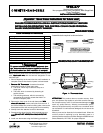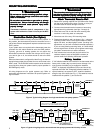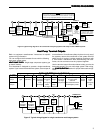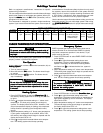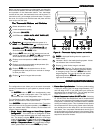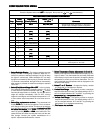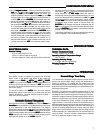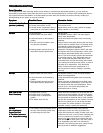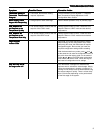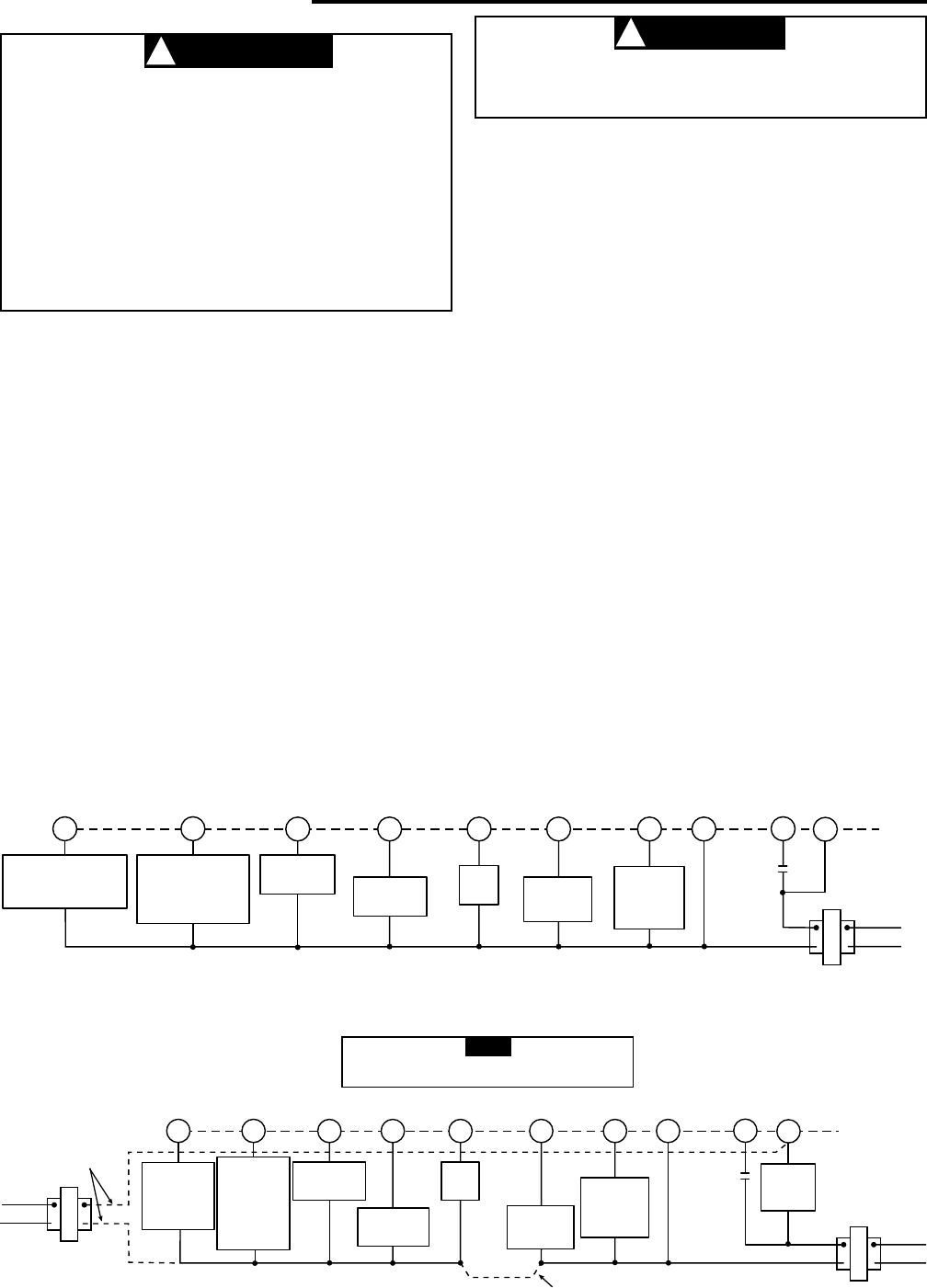
2
L
R
E/W1
24 VAC
120 VAC
Hot
SYSTEM
MONITOR
SWITCH
Neutral
THERMOSTAT
SYSTEM
G W2
Figure 3. Typical wiring diagram for two transformer heat pump systems with NO safety circuits
TRANSFORMER
(Class II Current Limited)
2nd Stage
Compressor
CY1
Y2
Compressor
Contactor
Aux
Relay
(Stage 2)
Fan
Relay
Emergency
or 1st Aux.
Stage
Relay
Limit or
Safety
Switches
TWO COMMONS MUST
BE JUMPERED TOGETHER!
HOT
NEUTRAL
120 VAC
24 VAC
CUT AND
TAPE OFF!
If safety circuits are in only one of the systems, remove
the transformer of the system with NO safety circuits.
NOTE
Reversing
Valve
Energized in
Heat, Off,
Emergency
Mode
B
Reversing
Valve
Energized in
Cool Mode
O
L
R
E/W1
24 VAC
120 VAC
Hot
SYSTEM
MONITOR
SWITCH
Neutral
THERMOSTAT
SYSTEM
G W2
Figure 2. Typical wiring diagram for single transformer heat pump systems
TRANSFORMER
(Class II Current Limited)
2nd Stage
Compressor
CY1
Y2
Compressor
Contactor
Aux
Relay
(Stage 2)
Fan
Relay
Emergency
or 1st Aux.
Stage
Relay
Reversing Valve
Energized in Heat,
Off, Emergency
Mode
B
Reversing Valve
Energized in Cool
Mode
O
MOUNTING AND WIRINGMOUNTING AND WIRING
MOUNTING AND WIRINGMOUNTING AND WIRING
MOUNTING AND WIRING
The ELEC/GAS switch is factory set to the ELEC position. In
this position, the thermostat will power the circulator fan on a
call for heat. Electric heat systems require the switch to be in the
ELEC position.
If your system does not require that the thermostat power the
circulator fan, this switch should be set to the GAS position.
Typically, gas and oil heating systems do not require the
thermostat to power the circulator fan during a call for heat. If
your heat is gas or oil, the switch should be set to the GAS
position.
When the thermostat is configured for Heat Pump, the thermo-
stat will always power the circulator fan on a call for heat in the
HEAT mode. The ELEC/GAS switch must be set to match the
type of Auxiliary heat your system uses for proper operation in
the EMERgency mode.
Electric/Gas Switch (Fan Option)Electric/Gas Switch (Fan Option)
Electric/Gas Switch (Fan Option)Electric/Gas Switch (Fan Option)
Electric/Gas Switch (Fan Option)
All wiring diagrams are for typical systems only. Refer to
equipment manufacturers' instructions for specific system wir-
ing information.
WARNING
!
Do not use on circuits exceeding specified voltage.Do not use on circuits exceeding specified voltage.
Do not use on circuits exceeding specified voltage.Do not use on circuits exceeding specified voltage.
Do not use on circuits exceeding specified voltage.
Higher voltage will damage control and could causeHigher voltage will damage control and could cause
Higher voltage will damage control and could causeHigher voltage will damage control and could cause
Higher voltage will damage control and could cause
shock or fire hazard.shock or fire hazard.
shock or fire hazard.shock or fire hazard.
shock or fire hazard.
Do not short out terminals on gas valve or primaryDo not short out terminals on gas valve or primary
Do not short out terminals on gas valve or primaryDo not short out terminals on gas valve or primary
Do not short out terminals on gas valve or primary
control to test. Short or incorrect wiring will damagecontrol to test. Short or incorrect wiring will damage
control to test. Short or incorrect wiring will damagecontrol to test. Short or incorrect wiring will damage
control to test. Short or incorrect wiring will damage
thermostat and could cause personal injury and/orthermostat and could cause personal injury and/or
thermostat and could cause personal injury and/orthermostat and could cause personal injury and/or
thermostat and could cause personal injury and/or
property damage.property damage.
property damage.property damage.
property damage.
Thermostat installation and all components of the
system shall conform to Class II circuits per the NEC
code.
Take care when securing and routing wires so they doTake care when securing and routing wires so they do
Take care when securing and routing wires so they doTake care when securing and routing wires so they do
Take care when securing and routing wires so they do
not short to adjacent terminals or rear of thermostat.not short to adjacent terminals or rear of thermostat.
not short to adjacent terminals or rear of thermostat.not short to adjacent terminals or rear of thermostat.
not short to adjacent terminals or rear of thermostat.
Personal injury and/or property damage may occur.Personal injury and/or property damage may occur.
Personal injury and/or property damage may occur.Personal injury and/or property damage may occur.
Personal injury and/or property damage may occur.
CAUTION
!
1. Remove the packing material from the thermostat. Gently
pull the cover straight off the base. Forcing or prying on
the thermostat will cause damage to the unit.
2. Connect wires beneath terminal screws on base using
appropriate wiring schematic (see figs. 2 through 4).
3. Place base over hole in wall and mark mounting hole
locations on wall using base as a template.
4. Move base out of the way. Drill mounting holes.
5. Fasten base loosely to wall, as shown in fig. 1, using two
mounting screws. Place a level against bottom of base,
adjust until level, and then tighten screws. (Leveling is for
appearance only and will not affect thermostat operation.)
If you are using existing mounting holes, or if holes drilled
are too large and do not allow you to tighten base snugly,
use plastic screw anchors to secure subbase.
6. Push excess wire into wall and plug hole with a fire-
resistant material (such as fiberglass insulation) to
prevent drafts from affecting thermostat operation.
Attach Thermostat Base to WallAttach Thermostat Base to Wall
Attach Thermostat Base to WallAttach Thermostat Base to Wall
Attach Thermostat Base to Wall
2 "AA" alkaline batteries are included in the thermostat at the
factory with a battery tag to prevent power drainage. You
must remove the battery tag to engage the batteries.
If BATT is displayed, the batteries are low and should be
replaced with fresh "AA" Energizer® alkaline batteries. To
replace batteries, set system to OFF, install the batteries
along the top of the base (see Fig. 1). The batteries must be
installed with the positive (+) end to the left.
Battery LocationBattery Location
Battery LocationBattery Location
Battery Location



